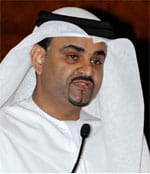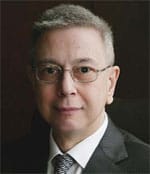MIDDLE EAST REGIONAL REPORT
In Dubai and other financial centers around the Middle East, there are increasing signs that prudence and a focus on Islamic financing are paying off.
 |
|
Sulaiman: Middle East economy is in a better position than other regions. |
Bankers in the Middle East say they have learned some lessons from the global financial crisis and the bursting of the property bubble in Dubai: Stay away from real estate and stock market speculation and take a defensive approach to lending.
While they have always been a careful lot, knowing that they live in a region subject to boom-and-bust economic cycles and political instability, the bankers have been chastened by recent events. Regional stock markets have been among the most affected.
“The global financial crisis provides a great opportunity for the Middle East to learn from the issues that the Western financial markets are facing,” says Omar Bin Sulaiman, governor of the Dubai International Financial Center (DIFC). “We need to fine-tune our corporate governance and regulatory systems to address the risks and vulnerabilities that the global financial crisis has revealed.”
The DIFC bridges the time gap between Hong Kong and London and has attracted more than 800 financial firms since it opened four years ago. Islamic finance is one of the key sectors it is focusing on. One of the main requirements for the sustained growth of Islamic finance is the availability of high-quality advisory services, such as shariah auditing, supervision and training, says Abdulla Al Awar, managing director of the DIFC Authority, which provides the overall strategy to the center. Al Awar spoke at a ceremony earlier this year marking the admission of Minhaj Shariah Financial Advisory to the DIFC. Minhaj will act as a shariah board for various financial institutions. It provides advisory and religious opinions and structures financial transactions in accordance with shariah standards.
“The market share of Islamic financing will continue to grow,” says Youssef Nasr, chairman of Dubai-based HSBC Bank Middle East. “Shariah-compliant financing offers a safer feeling because it is based on secured instruments,” he says.
 |
|
Shoman: Declining growth rates will be a challenge to bankers everywhere. |
The government of Dubai announced a $20 billion bond program in February to provide funding to meet its refinancing needs and keep development programs on track. The UAE central bank bought the entire first issue of $10 billion of five-year bonds. Real estate companies could be among the first beneficiaries of Dubai’s planned stimulus program.
Government spending on infrastructure and job creation can have both a psychological and a real impact on economies in the Gulf, says Adel El-Labban, chief executive of Bahrain-based AUB Group and managing director of Ahli United Bank, which has subsidiaries in Kuwait, Egypt and the UK and managed associate banks in Qatar, Oman and Iraq.
However, capital-spending projects usually involve the import of manufactured goods and the use of non-local labor, which means that only 10% to 20% of the spending has a direct impact on the economy, El-Labban says. “These projects also take two or three years to implement, with most of the spending in the later phases,” he says. “Spending on education, healthcare and government salaries would have a quicker effect.”
AUB recognized early last year that the real estate market in the Gulf was overheating, so the bank clamped down on mortgages and tightened its lending criteria, El-Labban says. “These measures served us well, and we avoided the bubble in the region,” he says.
While economic growth will slow this year, inflation will also subside. “The prognosis for 2009 is reasonably clear,” El-Labban says. “Lower oil revenues will have a contractionary effect. Our mantra is ‘prudence over profits,’ and we will take a very conservative stance on risk-taking,” he says.
AUB is midway through converting its Bank of Kuwait & the Middle East subsidiary into an entirely shariah-compliant institution. When completed in January 2010, the conversion will significantly expand the group’s Islamic assets and liabilities.
Bassem Ariss, Dubai-based regional manager of BLOM Bank France, says his bank has always taken a prudent approach and kept its focus on corporate finance and trade finance. The bank has had a presence in Dubai for 35 years. “We employ the prudence instilled in our culture and our ‘peace of mind’ motto,” Ariss says. “We serve prudent traders who come to a prudent bank, and we have seen Dubai’s business grow,” he says.
While the region takes pride in its prudence, it is not averse to taking calculated risks. The port of Jebel Ali, for example, established in 1977 at a cost of $3 billion, is the world’s largest man-made harbor and the biggest port in the Middle East. When it was proposed, many feared it would become a huge white elephant, but it did the opposite, helping drive Dubai’s growth into a regional trading center. Dubai Ports World has just completed Terminal 2, increasing the port’s annual capacity to 14 million 20-foot containers.
In Jordan, Abdel Hamid Shoman, chairman and CEO of Amman-based Arab Bank, says 2008 witnessed sharp fluctuations in commodity prices and production costs. It was a year in which the global financial crisis extended to regional markets. Despite the turmoil, Arab Bank’s earnings rose 8.4% to $840 million last year, the highest since the bank was established 78 years earlier.
The projected decline in global economic growth rates in 2009 will be a challenge to bankers everywhere, Shoman says. He praised the prudent fiscal policy of the Central Bank of Jordan and its firm application of international standards to maintain the soundness of the Jordanian banking system in terms of capital adequacy and asset quality.
Shoman says the fact that numerous individual and corporate customers made deposits with Arab Bank’s local and overseas branches last year shows that they perceive the bank as a safe haven. The bank’s deposits increased by 27% in 2008 to more than $31 billion.
Nader Dahabi, Jordan’s prime minister, says that the country’s economic outlook is good but that the kingdom is also facing uncertainty. “We should not panic, yet we should not sleep on satin sheets pretending that nothing will go wrong,” he told a press conference last month.
Central banks across the region have shifted their monetary-policy focus from restraining inflation to ensuring that banks have adequate liquidity. “Of course, the global and regional economic outlook has changed considerably [from a year ago], and sentiment is not what it was,” says Sulaiman of the DIFC. “Yet it is important to note that the region is in a far better position than other parts of the world,” he says.
Gordon Platt



